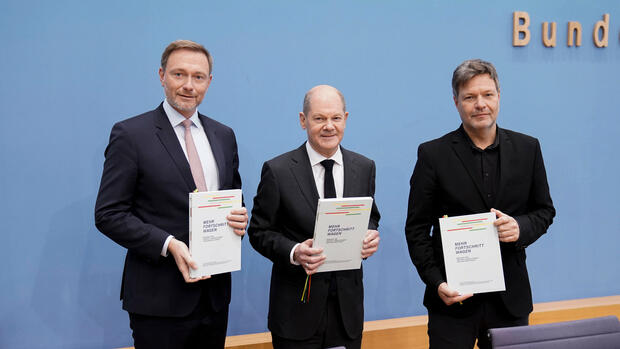Halfway through the legislative period, the Bertelsmann Foundation, together with the University of Trier and the Progressive Center, tried to draw an objective balance – and came to a surprisingly positive result.
Accordingly, the traffic light has already implemented many of its projects, also in comparison to previous governments. Robert Vehrkamp from the Bertelsmann Foundation speaks of an “overall very promising half-time balance”.
The scientists first examined what the traffic light was up to. They count 453 government promises in the coalition agreement between the SPD, the Greens and the FDP. Compared to the last grand coalition, this is a good 50 percent more; in 2018 there were 296 measures in the coalition agreement. In 2013 there were only 188.
In a second step, the experts then checked what had become of the promises. “At the halfway point of its government, the traffic light has already fully or partially fulfilled 174 of its 453 promises (38 percent),” says the analysis. Those that have already been passed, such as the increase in the minimum wage or projects such as compliance with the debt brake in the current year, count as fully met.
The Bertelsmann Foundation considers projects that were implemented but not quite as intended in the coalition agreement to be partially fulfilled. One example is the “National Security Strategy”, which according to the coalition agreement should be presented “in the first year of the new federal government”. In fact, it was only decided in June, much later.
>> Read here: The Federal Audit Office calculates the traffic light’s budget policy
Implementation has begun on a further 117 promises (26 percent). Of these, 55 are “in the process of fulfillment,” as the analysis states. For example, there is already a draft law.
This includes hospital reform. 62 “were addressed.” A concrete draft law is still missing, but the coalition is beginning to work on key points. An example is the stock pension.
A third of the projects have been left behind
However, the remaining promises, a good third, have not yet been addressed. This includes a new digital pact for schools and the goal of building 400,000 new apartments annually.
>> Read here: The Greens and FDP want to do more for the economy
“Compared to the mid-term balance of the previous government, the traffic light achieved a little less proportionally, but in absolute government projects it actually achieved a little more,” says the analysis.
The experts also examined whether the projects from the coalition agreement were previously included in an election program. The two smaller coalition partners can score points here. Accordingly, the Greens were able to make 72 promises in the coalition agreement, 20 of which were implemented. For the FDP there are 45, of which 21 have been processed.
The SPD only comes up with 19 promises, ten of which have already been processed. The study authors explain this with the chancellor effect, which can be expected from coalition and negotiation theory and has already been visibly negative in previous governments. The respective chancellor’s party must pay for the takeover of the chancellery “with programmatic concessions to the coalition partners in the coalition agreement,” it says in the paper.
“Reflection on the virtues of coalition negotiations”
From the perspective of its supporters, the SPD scored points by increasing the minimum wage to twelve euros. For the Greens, the most important thing is the coal phase-out and greater support for renewable energies. For the Liberals, compliance with the debt brake and the faster planning and approval procedures are a success.
>> Read here: Scholz calls for a national effort
However, the implementation of the comparatively large number of projects is hardly rewarded by citizens. For the study, the Allensbach opinion research institute conducted a representative survey on satisfaction with the traffic light coalition. Accordingly, only twelve percent of those surveyed believe that “all, almost all or a large part” of the agreed coalition promises will be implemented. 43 percent of all respondents assume that only “a small proportion or hardly any” will be implemented.
The authors attribute this to the public dispute between the SPD, the Greens and the FDP. “This leads to dissatisfaction and a sharp decline in trust in the faithfulness of government actions,” says the analysis. The study authors therefore have a recommendation for the coalition partners: “A reflection on the virtues of the coalition negotiations and the spirit of their ambitious coalition agreement would certainly not harm the traffic light government.”
More: “Germany is engaging in wanton self-mutilation”

